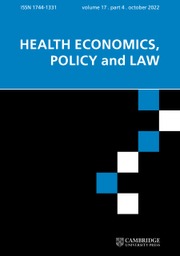Article contents
Physicians' attitudes towards accelerated access to medicines
Published online by Cambridge University Press: 31 October 2019
Abstract
In recent years, a variety of ‘accelerated access’ schemes have been introduced by pharmaceutical regulators and funders globally. These schemes aim to overcome perceived regulatory and reimbursement barriers to accessing medicines – particularly for patients with limited time or therapeutic options. However, patient access to approved medicines is mediated by a number of third parties including regulators and payers, and physicians who act both as gatekeepers and guides to prescribed medications. It is therefore essential to know how physicians think about accelerated access as they are responsible for advising patients on and prescribing medicines made available via these pathways. We conducted semi-structured interviews with 18 Australian physicians focusing on their attitudes towards accelerated access. We identified three ‘archetypes’ of physicians: ‘confident accelerators’, ‘cautious accelerators’, and ‘decelerators’. Although all acknowledged the potential risks and benefits of accelerated access, they disagreed on their magnitude and extent and how they should be balanced in both policy formation and clinical practice. Overall, our results illustrate the diversity of clinical opinions in this area and the importance of monitoring both the prescribing and clinical outcomes that result from accelerated access programmes to ensure that these are both clinically and morally acceptable.
Keywords
- Type
- Article
- Information
- Copyright
- Copyright © Cambridge University Press 2019
References
- 3
- Cited by



